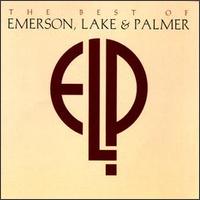Rating: 5 (library disc)
 In addition to all my usual prejudices, I have to add a religious bias to this review. You see, I’m an Episcopalian, so I’ve got an ear for Anglican hymns, and therefore I must say that ELP’s rendition of “Jerusalem” is one of the coolest things I’ve ever heard a rock band do. It’s a selection from the hymnal, with a text by none other than William Blake, but the group performs it with panache and power. Greg Lake’s vocal is strong yet smooth; he’s simply a wonderful singer. And Carl Palmer pulls most every percussion trick known, from cymbal rolls to a gong, always emphasizing the structure of the tune. Keith Emerson does a fine job on organ, too, with just the right amount of pomp to render the majesty of the song.
In addition to all my usual prejudices, I have to add a religious bias to this review. You see, I’m an Episcopalian, so I’ve got an ear for Anglican hymns, and therefore I must say that ELP’s rendition of “Jerusalem” is one of the coolest things I’ve ever heard a rock band do. It’s a selection from the hymnal, with a text by none other than William Blake, but the group performs it with panache and power. Greg Lake’s vocal is strong yet smooth; he’s simply a wonderful singer. And Carl Palmer pulls most every percussion trick known, from cymbal rolls to a gong, always emphasizing the structure of the tune. Keith Emerson does a fine job on organ, too, with just the right amount of pomp to render the majesty of the song.And this song serves as the epitome of ELP – L&P are always excellent, but E has some significant limitations. He’s terrific when it comes to performing other people’s music (particularly when it’s loud and fast), but the fruits of his own imagination leave something to be desired.
This group has been accused of combining rock and roll and classical music, but they don’t do anything so dastardly (that’s more in the lines of Electric Light Orchestra). What they do, instead, is play classical music on rock and roll instruments, and even that statement is not strictly true. The Hammond organ, Keith Emerson’s main instrument, has become associated with rock and soul, but it was originally marketed for churches that are too small for a pipe organ, so it’s perfectly legitimate to play classical music on it.
Emerson has some of the chops necessary to pull off this feat, too; for example, on “Knife Edge”, an adaptation of Janáèek’s “Sinfonietta”, he blazes through the complex main theme with nary a missed note. But sometimes he lacks a little something called “feel”, which encompasses dynamics and attack. His rendition of Copland’s “Hoedown” is played full-bore throughout, when the score actually calls for a spritely dance-like feel.
And his own compositions are limited, to be charitable. Take the epic “Tarkus”; in between what sound like very professional compositions from Greg Lake, filled with his liquid voice, we get what sounds like five variations on the same stupid theme, basically Emerson playing finger exercises as fast as he can. On the other hand, he plays “Honky Tonk Train Blues” brilliantly.
Emerson aside, the group has a lot to offer. Lake’s guitar work is exquisite, with delicate fingerpicking on his acoustic numbers (“From the Beginning”, “C’Est La Vie”) and a clever use of wah-wah to funk up the works on “Still...You Turn Me On”), and his compositions have a spare beauty that draws on the best traditions of Western music, from parlor ballads (“Trilogy”) to Appalachian folk song (“I Believe in Father Christmas”) to medieval madrigal (“Lucky Man”). If these gems are sometimes ruined by an odd blaring synthesizer, it’s not Lake’s fault (except that he produced the records and allowed it to happen). And I’ve already raved about his wonderful voice, with its rich tone and excellent delivery (except on “Black Moon” where he decided to sing like Roger Daltrey.)
So, if you’re a big fan of fine keyboard playing, this group will drive you crazy with its excessive volume and speed. But if you don’t mind some lengthy overblown instrumentals in between creatively composed and excellently sung tunes, by all means this is your kind of record.